Partners Introduce AT-Info-Map V1 App
27 November, 2016
The core implementing partners of the Assistive Technology Information Mapping (AT-Info-Map) project – SAFOD, Dimagi, AfriNEAD and University of Washington – have officially introduced the first version (V1) of the AT-Info-Map App to various stakeholders in Botswana, including AT suppliers, Disabled Peoples Organizations (DPOs), community rehabilitation officers, officers from line government ministries and departments, as well as representative of quasi-government agencies.
The presentation and orientation of the V1 were done in a series of orientation workshops and meetings held during the month of November 2016, which was also part of testing the App, while getting ready for modifications to the system expected to be done between November 2016 and January 2017 to ensure it is useful to both suppliers and users of AT. The workshops were organized to orient partners, suppliers, and users, on how to use the App once it is finalized in February 2017.
Our technology partner, Dimagi, has developed an open-source technology system (CommCare) that is being used in this project to collect and provide information about AT availability. At the stakeholders’ workshops and meetings, partners did not only present the V1 of the App, but also gathered feedback to inform modifications with regards to how best the App could be operationalized in Botswana and beyond. The workshops and meetings provided the stakeholders an opportunity to view and appreciate how the App currently looks, and further explored how the App could be improved to meet some of their initial expectations that were expressed during the official launch of the project in April this year.
Government Departments and agencies that participated included the Ministry of Education, Ministry of Health, MVA Fund. Some of the partners consulted included the World Health Organization (WHO) Country Office; Cheshire Botswana, Deaftronics, and Camphill Community Trust. The DPOs that participated were members of the Botswana Federation of the Disabled (BOFOD) representing hearing impairment, physical disability, visual impairment, and albinism.
During these workshops an d meetings, there was a general consensus that the project, particularly the App, had come at an opportune time when there were various challenges rocking the AT sector, ranging from lack of awareness and information within the communities and even among some suppliers, to difficulties in accessing the appropriate ATs by those who need them.

